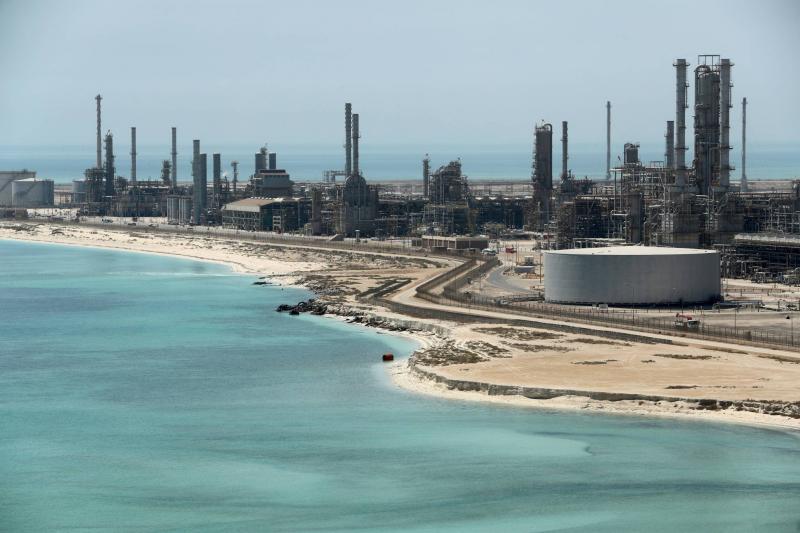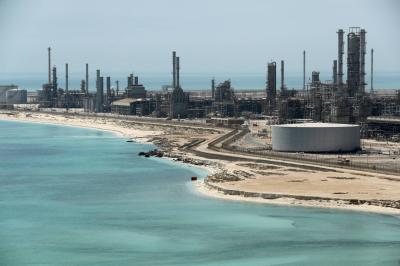The Kingdom of Saudi Arabia, the largest producer in the Organization of the Petroleum Exporting Countries (OPEC) and the member with the greatest flexibility in adjusting production levels, has an unparalleled influence over the oil market.
Several sources within OPEC+ told Reuters that Saudi Arabia enforced a veil of secrecy over its large production cut plan during alliance talks in Vienna earlier this week, with some member countries learning of the cut decision only during the closing press conference. The Kingdom's ability to increase or decrease production gives it unmatched control over the oil market, although the impact on crude prices since the announcement of its plans has been modest so far. Previously, Saudi Energy Minister Prince Abdulaziz bin Salman has relied on surprise as a tactic in managing oil markets, especially as prices come under pressure from concerns about a weakening global economy and its effects on demand. Just days before the OPEC+ meeting, Prince Abdulaziz warned that he would inflict more pain on short sellers or speculators betting on falling oil prices, urging them to be cautious.
Riyadh did not disclose any significant details or specifics before the meeting. Four OPEC+ sources, part of delegations involved in the talks, stated they only learned of the Saudi cut details during the press conference Sunday evening. The sources explained that the idea of a cut had not been raised during discussions this week regarding a broader supply reduction agreement extending into 2024. One source said, "No information about the additional cuts was disclosed before the press conference. It was a surprising decision, once again."
Saudi Arabia announced a production cut of ten percent or one million barrels per day starting in July, reducing output to nine million barrels per day, with the possibility of extending this cut if necessary. Meanwhile, OPEC+ members agreed to extend reductions until the end of 2024 but did not commit to new reductions for the current year. OPEC+ produces about 40 percent of the world's total crude oil, comprising OPEC nations and non-OPEC allies led by Russia.
In addition to the Saudi cut, OPEC+ also lowered its targeted production for 2024 and the nine participating countries extended their voluntary cuts from April until the end of next year. The UAE, for its part, received a higher production quota it has sought for a long time, a matter that has previously caused tensions between the group and Abu Dhabi, which is increasing its production capacity. The Saudi Ministry of Energy and OPEC headquarters in Vienna did not respond to requests for comment.
OPEC+ members did not express a desire for joint cuts. In the days leading up to the June 4 meeting, two other OPEC+ sources indicated that a proposal for further production cuts was discussed, though discussions had not reached advanced stages in Vienna. Other OPEC+ sources noted that Saudi Arabia acknowledged the difficulty in securing commitment for cuts from other countries like the UAE and Russia, which sources said were hesitant about further cuts before the meeting. One OPEC+ source stated, "The Saudis were aware this time that they could not push the others... the UAE was satisfied with the new quota, which is a significant relief for the Saudis."
Despite this, Saudi Arabia managed to persuade other OPEC+ nations that are unable to achieve their production targets due to a lack of investment in production capacity, particularly Nigeria and Angola, to accept lower production targets for the coming year after extensive meetings. Prince Abdulaziz told Al Arabiya after the meeting that the bloc was tired of allocating production quotas to countries unable to produce them, and that Russia needed to pursue transparency regarding its production levels and exports.
All producing countries would benefit if they could maintain current production levels. OPEC+ sources indicated that the new target levels for production for Angola and Nigeria were still above what the countries could actually pump, meaning they would not have to implement any actual cuts. Meanwhile, Russia, which continues to have strong exports despite Western sanctions, avoided additional production cuts.
It remains unclear if Saudi Arabia hinted at the possibility of a voluntary reduction during discussions with some Russian officials or African oil-producing nations to help convince them to agree to a broader deal. However, it is certain that all these producing nations would benefit if they could maintain their production levels as is or pump slightly more, especially if the Saudi voluntary cut succeeds in boosting prices.
One OPEC+ source suggested that the Saudi cut might also give the Kingdom more leverage in the coming months to pressure countries that do not cut production but still benefit from reductions by others. Another source from OPEC+ stated, "To avoid continued free-riding, Saudi Arabia could threaten to bring back a million barrels per day to the market within 30 days, which would lead to a price drop," though they did not specify which countries might be targeted by such a threat. Oil prices rose slightly following the Saudi plan, with Brent crude trading above $77 per barrel last Thursday.
Stephen Brennock from PVM Oil Brokerage noted, "Saudi production cuts play a secondary role in contributing to concerns about the state of the global economy," but added that they could exacerbate supply shortages in July. He concluded, "Thus, it would take a bold bet to wager that prices won't eventually rise."




